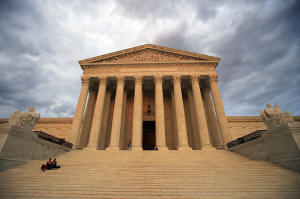Supreme Court takes up $8 billion phone and internet subsidy for rural
and low-income areas
[March 26, 2025]
By MARK SHERMAN
WASHINGTON (AP) — The Supreme Court hears arguments Wednesday in a major
legal fight over the $8 billion a year the federal government spends to
subsidize phone and internet services in schools, libraries and rural
areas, in a new test of federal regulatory power.
The justices are reviewing an appellate ruling that struck down as
unconstitutional the Universal Service Fund, the tax that has been added
to phone bills for nearly 30 years.
Tens of millions of Americans have benefited from the programs that
receive money from the fund and eliminating it “would cause severe
disruptions,” lawyers for associations of telecommunications companies
wrote.
The Federal Communications Commission collects the money from
telecommunications providers, who then pass the cost on to their
customers.
A conservative advocacy group, Consumer Research, challenged the
practice. The justices had previously denied two appeals from Consumer
Research after federal appeals courts upheld the program. But the full
5th U.S. Circuit Court of Appeals, among the nation’s most conservative,
ruled 9-7 that the method of funding is unconstitutional.
The 5th Circuit held that Congress has given too much authority to the
FCC and the agency in turn has ceded too much power to a private entity,
or administrator.
The last time the Supreme Court invoked what is known as the
non-delegation doctrine to strike down a federal law was in 1935. But
several conservative justices have suggested they are open to breathing
new life into the legal doctrine.

The conservative-led court also has reined in federal agencies in
high-profile rulings in recent years. Last year, the court reversed a
40-year-old case that had been used thousands of times to uphold federal
regulations. In 2022, the court ruled Congress has to act with
specificity before agencies can address “major questions,” in a ruling
that limited the Environmental Protection Agency’s ability to combat
climate change.
[to top of second column]
|

The U.S. Supreme Court is seen near sunset in Washington, Oct. 18,
2018. (AP Photo/Manuel Balce Ceneta, File)

The Trump administration, which has moved aggressively to curtail
administrative agencies in other areas, is defending the FCC
program. The appeal was initially filed by the Biden administration.
“Neither Congress’s conferral of authority on the FCC, the FCC’s
reliance on advice from the administrator, nor the combination of
the two violates the Constitution,” acting Solicitor General Sarah
Harris wrote in a Supreme Court brief.
Consumer Research calls the situation a “nightmare scenario” in
which Congress has set no limits on how much the FCC can raise to
fund the program. “Predictably, the USF tax rate has skyrocketed. It
was under 4% in 1998 but now approaches 37%,” lawyers for the group
wrote.
They said there's an easy fix: Congress can appropriate money for
the program, or at least set a maximum rate.
But last year, Congress let funding lapse for an internet subsidy
program, the Affordable Connectivity Program, and the FCC moved to
fill the gap by providing money from the E-rate program, one of
several funded by the Universal Service Fund.
Congress created the Universal Service Fund as part of its overhaul
of the telecommunications industry in 1996, aimed at promoting
competition and eliminating monopolies. The subsidies for rural and
low-income areas were meant to ensure that phone and internet
services would remain affordable.
A decision is expected by late June.
All contents © copyright 2025 Associated Press. All rights reserved |